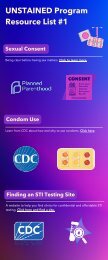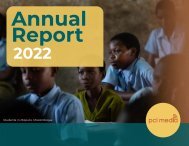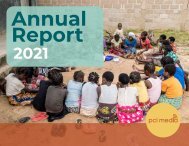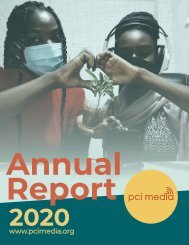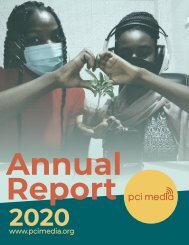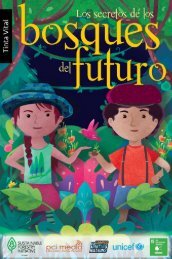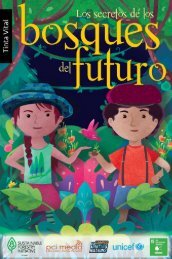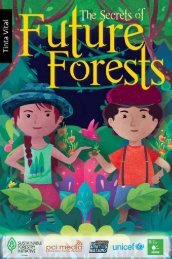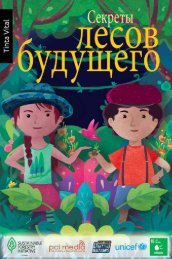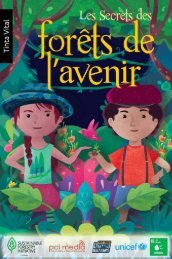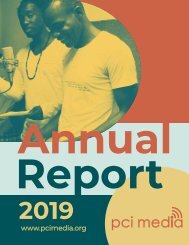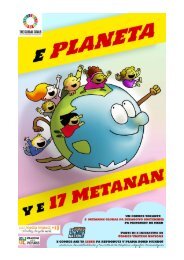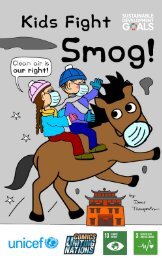Annual Report 2015
You also want an ePaper? Increase the reach of your titles
YUMPU automatically turns print PDFs into web optimized ePapers that Google loves.
PCI MEDIA IMPACT<br />
<strong>2015</strong><br />
ANNUAL REPORT<br />
- 1 -
Our Mission.<br />
PCI Media Impact empowers communities worldwide<br />
to inspire positive social and environmental change<br />
through storytelling and creative communications.<br />
- 2 -
Foreword.<br />
<strong>2015</strong> has been a ground-breaking year for PCI-Media Impact, both for the range of the<br />
programs we have launched, and for the recognition that those programs have received.<br />
We dove into challenges as they arose, launching such disparate initiatives as Comics Uniting<br />
Nations, a global set of comic books for the UN’s Sustainable Development Goals, and the<br />
La Caldera curriculum, a drama and lesson plan that tackles human trafficking in Bolivia.<br />
Regardless of the media we selected or the topic, for each program we stayed true to our<br />
tried and tested approach to storytelling for social change. We believe that this pairing of<br />
consistency and innovation is responsible for the 17 international awards for work completed<br />
in <strong>2015</strong>, including a Millbank Social Marketing Award, a Video Marketing Excellence (VMX)<br />
Award, a Webby, and even a Rockie nomination.<br />
As Co-Chairs of the Board of this innovative organization, it is our honor to share with you<br />
these institutional successes. What may be even more important is to share with you our<br />
enthusiasm for this organizatio’s work, and how it has changed each of our personal stories,<br />
as well as impacting the experiences of all the staff and volunteers worldwide who participate<br />
in using the power of story. Each has found their own unique path to their passion for this<br />
mission.<br />
The same can be said of problem solving. A single mother in Mozambique who aims to<br />
protect her young child from illness to communities throughout the subcontinent of West<br />
Africa working together to eradicate Ebola. Each in their own way bring their own personal<br />
stories and background knowledge to the table to create a better, safer world for themselves<br />
and their children.<br />
The PCI Media Impact storytelling approach is the ideal vessel for these diverse perspectives.<br />
Our communication work always begins with the beliefs, stories and approaches of individual<br />
problem solvers. We identify positive deviants and good community practices, and recognize<br />
the thinking that leads to effective solutions. Then, building on narratives that already exist,<br />
we create role models. Often, these models are fictional characters in a drama, but they<br />
might also be the nonfiction stories of local heroes, the voices of pop stars, or the actions of<br />
governments. These models allow our audiences to imagine and create better, more effective<br />
solutions for themselves.<br />
This tactic – the practice of social and behavioral change communication – should not be an<br />
afterthought to change planning. It is integral to any endeavor.<br />
Our sensitivity to audiences’ stories brings creative solutions to light, and allows us to be<br />
on the frontline of innovation. We have responded to a shifting media landscape, using an<br />
increasingly diverse set of communication media to tell the story, from comic books to mobile<br />
apps, documentaries to soap operas, each uniquely based on its audience’s needs.<br />
The world will face no shortage of challenges in the coming decade. From global warming to<br />
health outbreaks like Zika. Most of these issues rely on collective action, counting on a global<br />
community willing to engage as problem solvers, to shift their own attitudes and behaviors.<br />
It continues to be an honor to represent PCI Media Impact, an organization that has the<br />
capacity to play a pivotal role in these issues. We look forward to another year of persuasive<br />
and relatable stories that can capture our imagination, influencing the way we choose to live.<br />
Lynne Yeannakis & Rick Stone, Co-Chairs of the Board of Directors<br />
- 3 -
Overview.<br />
“A story is the shortest distance between people.”<br />
I love this Pat Speight quote. It speaks to the fundamental reason we do what we do – the<br />
reason we use the vehicle of storytelling to inspire change. Story is convincing. Story is<br />
empowering. Story shares information while bringing people together.<br />
When a person hears a story they empathize with, that story often becomes a role model for<br />
their own lives.<br />
Miguel Sabido was one of the early advocates for popular storytelling as a means of behavior<br />
change. Ever since PCI Media Impact’s founder David Poindexter worked with Sabido and<br />
Indira Ghandi over 30 years ago, our organization has held this idea at the core of our<br />
work: it is everyday people that will make the change, so it is everyday people we need to<br />
communicate with.<br />
With more than thirty years of programming and institutional learning, we have come a long<br />
way. Our “storytelling” was once only delivered in the form of serial soap operas. Now, we<br />
work with television, radio, social media, music, comic books and documentary. We build<br />
diverse coailtions of stakeholders who learn from these stories, as well as from one another.<br />
From donors, to consumers, to our colleagues on the ground, we are an organization based<br />
on partnerships. Our mission is successful when our audiences are part of the positive change,<br />
when our coalitions of partners outlast programs themselves, when we enhance the capacity<br />
of individual communicators and change agents.<br />
<strong>2015</strong> has been an extraordinary year. We continued our campaign to end Ebola, producing<br />
radio dramas, call-in shows, music videos, and powerful survivor stories. The success of our<br />
initial work gained #ISurvivedEbola features on CNN International, BBC Worldwide, and<br />
Newsweek. Our partners grew from 3 to over 75. This propelled us into a deep collaboration<br />
with the CDC, leading to further creative solutions in Guinea and Sierra Leone.<br />
On the other side of the globe, our long-running, celebrated Strong Women, Strong Voices<br />
program in Latin America continued through a partnership with the Department of State. The<br />
show, designed to address violence against women in Colombia, Bolivia, and Peru, has now<br />
played on over 120 community radio stations, supported through demonstrations, school<br />
visits and community-led actions.<br />
Meanwhile, Punta Fuego, a program on sustainable fisheries in Belize rode a wave of popular<br />
success, gaining a set of die-hard fans. More rewarding than the numbers, however, are<br />
the testimonials of fishermen who have changed their own fishing practices because of the<br />
experiences of their favorite character, Richie.<br />
These are only a few examples of the beautiful work our teams around the world have<br />
accomplished this year, none of which would be possible without the generous, steadfast<br />
support of our institutional partners and individual donors. We are thankful to each and every<br />
one of you for your committment to our shared vision of a new global narrative.<br />
Sean Southey, CEO<br />
- 4 -
How We Tell Our Stories.<br />
As a communications for social change organization, PCI Media<br />
Impact uses radio, television, music, digital and other media to<br />
turn up the volume on crucial issues around the globe.<br />
Focusing on Health, Environment and Social Justice,<br />
we strengthen the CAPACITY of partners; we create a<br />
COMMUNITY of constituents who support our collaborative<br />
work; and we promote positive CHANGES in audience<br />
knowledge, attitudes and behaviors.<br />
- 5 -
Then and Now<br />
Cecilia, a young woman from a settlement in Pucallpa, Peru, is the first to point out the alarming<br />
teen pregnancy rates in her community.<br />
“Anywhere you turn you will see an adolescent mom. I turned 23 this year. And from my whole<br />
cohort, I am the only one who does not have a baby,” Cecilia said.<br />
But she is also one of the first to do something about it.<br />
Cecilia has been part of our sexual health and family planning work as a participant, volunteer<br />
and coordinator since 2010. She was introduced to our characteristic community-driven<br />
storytelling by our Latin American Regional Director, Javier Ampuero, and fell in love with it.<br />
“Something lit up inside of me. When you make [a community] feel a part of it, they can feel<br />
like ‘this is mine, I can actually contribute to the change in my community, my region, my<br />
country.’”<br />
Cecilia is one of many budding community role models who act as agents of positive change<br />
thanks to PCI Media Impact. Twenty-five years before Cecilia met Javier and learned about<br />
Entertainment-Education, David Poindexter was founding PCI Media Impact, and already<br />
working on family planning issues.<br />
Through our approach with programs such as Hum Log and Dukh Sukh Apney and, more<br />
recently, Sin Arrugar and Cora Corazón, young women like Cecilia have not only been<br />
audience members of our shows but have also contributed to scripts and mobilization<br />
activities, radio broadcasts and call-in shows.<br />
Though our channels and audiences have increased over the years, our aims remain the<br />
same: we create MOVEMENTS.<br />
Cecilia falls in love with storytelling for social change so that her peers can fall in love with<br />
characters that resist teenage pregnancy. Javier, and the rest of our staff around the world,<br />
train young leaders so that they can train their own constituencies. And all of us, from Liberia<br />
to Peru to New York City, tell the story of a better world in order to make that better world a<br />
true possibility.<br />
- 6 -
Major Partners.<br />
• Auder<br />
• Bioclimate<br />
• CARE<br />
• Centers for Disease Control<br />
• Fauna and Flora International<br />
• Project Everyone<br />
• Radio Everyone<br />
• IUCN<br />
• The Nature Conservancy<br />
• The Paul G. Allen Foundation<br />
• The University of Texas at El Paso<br />
• Journalist and Writers Foundation<br />
• METI<br />
• Metronix Foundation<br />
• UNFPA<br />
• UNICEF<br />
• United Nations Framework Convention on Climate Change<br />
• United Nations Development Program<br />
• USAID<br />
• U.S. Department of State<br />
• U.S. Fish and Wildlife Service<br />
• U.S. Forest Service<br />
• Vulcan Productions<br />
• WCS<br />
• World Bank<br />
- 7 -
Our Programs.<br />
Let’s Speak<br />
Out<br />
REDD+ Libe<br />
Guardians<br />
of the Mist<br />
Voices of<br />
the Mist<br />
Punta Fuego<br />
My School<br />
My Community<br />
Comics<br />
Uniting<br />
Nations<br />
Tim Tim<br />
ECMMAN<br />
Cora Corazón<br />
Young People<br />
Who Tell Stories<br />
to Inspire<br />
Change<br />
Sin Arrugar<br />
Voices of<br />
Justice<br />
La Caldera<br />
Strong Women<br />
Strong Voices<br />
#ISurvivedEbola<br />
Campaign<br />
Road to<br />
Recovery<br />
- 8 -
ia<br />
STEWARD<br />
& PROSPER<br />
My Green<br />
Gabon<br />
My Gorilla<br />
My Commnity<br />
Ndovu Music<br />
Violence<br />
Against<br />
Children<br />
Psychosocial<br />
Support<br />
WABiCC<br />
My Chimp<br />
My Community<br />
Black Gold<br />
Ebola Mobile<br />
Response Unit<br />
REDD+ Malawi<br />
100% Bihar<br />
The Polio<br />
Switch<br />
- 9 -
Environment.<br />
Featured Program: Punta Fuego<br />
<strong>2015</strong> marked the completion of the first season of Punta Fuego, a radio drama on sustainable<br />
fisheries that was broadcast across Belize.<br />
This serial radio drama, call-in show and mobilization campaign took important steps to<br />
promote responsible fishing practices, as well as to increase respect for marine protected areas<br />
and replenishment zones. The community-driven, participatory approach and passionate<br />
plotline contributed to its large listenership within the fisher community. Mobilization<br />
activities such as a “fisher of the year” competition brought in another layer of celebrating<br />
good practices and involving community changemakers.<br />
Fishermen and women enjoyed listening to the show, claiming that it represented their lives<br />
and struggles in a way that they rarely experienced.<br />
“We gain[ed] a sense of importance and relevance to society [through Punta Fuego],” one<br />
fisher said; and another, “many people don’t know what we go through and so the show<br />
helps people to understand our struggles”.<br />
Program Overview<br />
Punta Fuego, a serial drama broadcast on Love FM in Belize, is implemented by PCI Media<br />
Impact and the Wildlife Conservation Society with funding from the Oak Foundation. Season<br />
One, which aired in <strong>2015</strong>, had a total of 23 entertainment-eduaction episodes. Its overall aim<br />
is to promote positive change in the relevant knowledge, attitudes, and behaviors towards<br />
responsible fishing, marine protected areas and replenishment zones (no-take zones) for<br />
sustainable fisheries in Belize.<br />
Its first season had four main goals. First, to stregthen the capacity of organizations across<br />
Belize to effectively design and implement Entertainment-Education communications<br />
strategies for long-term change. Second, to build a community of supporters that engages<br />
- 10 -
in activities to promote the benefits of marine protected areas and replenishment zones for<br />
sustainable fisheries. Third, to promote positive change in the relevant knowledge, attitudes<br />
and behaviors towards responsible fishing, marine protected areas and replenishment zones<br />
(no-take zones) for sustainable fisheries in Belize. And fourth, to foster political support for the<br />
expansion and designation of replenishment zones and marine resource conservation more<br />
generally.<br />
The program’s participatory approach involved fishermen, the audience, at every stage of the<br />
process: from formative research, to scriptwriting, to community mobilization. Initial workshops<br />
had an open call to those who wished to participate. Stories and framing suggested by those<br />
fishermen became the basis for the drama’s loveable cast of characters.<br />
Program Results<br />
An analysis of data collected during the first season of Punta Fuego indicated that the show’s<br />
success exceeded expectations.<br />
An analysis of the pretest-posttest evaluation showed that of the 55.2%<br />
of the sampled individuals who had heard of Punta Fuego, nearly<br />
80% were listeners. In addition, listeners of the radio drama were<br />
significantly more likely to exhibit correct knowledge, posess positive<br />
attitudes, report interpersonal communication, and perform positive<br />
fishing behavirs compared to non-listeners.<br />
Not only were listeners more likely to have absorbed and acted on<br />
these key messages – but those who listened to more of the show were<br />
more impacted, with an exposure analysis accounting for 12% of the<br />
change in knowledge and 19.5% of the change in attitudes.<br />
The results overwhelmingly show that the powerful story of Punta<br />
Fuego motivated people to do things that they would not otherwise<br />
have done. Qualitative data mirrored the quantitative results, and these<br />
testimonials are some of the most powerful representations of what the<br />
program was able to do. As one fisherman put it:<br />
“I will be honest, I used to fish in the zones from time to time, but now I think about what I hear<br />
in the show and I don’t think I will be doing that again.”<br />
Our Impact.<br />
CAPACITY: We built the capacity of our core partners to deliver entertainment-education<br />
drama on sustainability.<br />
COMMUNITY: We brought the fisheries department together with fishermen and civil society<br />
organizations to popularize and sensitize on “no-take zones” for sustainable fisheries.<br />
CHANGE: Drama listeners were more likely to exhibit correct knowledge, positive attitudes,<br />
interpersonal communication, and positive fishing behavirs compared to non-listeners.<br />
RECOGNITION: Punta Fuego was the recipient of the Millbank Social Marketing Award for<br />
Innovations in the Environmental Field.<br />
- 11 -
Health.<br />
Featured Program: #ISurvivedEbola<br />
In <strong>2015</strong>, PCI Media Impact dialed up our work taking this communications for social change<br />
model to an emergency health situation: the Ebola outbreak.<br />
#ISurvivedEbola was the first campaign to directly engage Ebola survivors from Guinea, Liberia<br />
and Sierra Leone in the national and international initiative to end the ongoing outbreak. The<br />
campaign placed survivors and survivor stories at the center of its efforts. It worked to inform<br />
the West African general public about the virus and how they could protect themselves<br />
and their communities from it; to reduce stigmatization and promote reintegration of Ebola<br />
survivors; and to shift the international narrative around the Ebola outbreak away from fear and<br />
despair, toward resilience and hope, while vigorously addressing the remaining challenges.<br />
Josephine Karwah, a young Liberian, was the first pregnant woman to survive Ebola. After a<br />
tumultuous recovery, she joined the movement of survivors working to inform and protect<br />
others from the disease. She was reluctant to tell her story at first, but that quickly changed:<br />
“You know, when they first asked me to be part of the campaign, I didn’t want to tell my story.<br />
But finally, I did; and as I told my story, I felt myself getting stronger. I kept telling it then, more<br />
and more. And now, every time I tell it I feel stronger still.”<br />
Program Overview<br />
The campaign was launched in 2014, when limited knowledge, survivor stigma and mistrust<br />
of medical facilities were inhibiting peoples’ efforts to slow the spread of Ebola in West Africa.<br />
30 documentary short films of survivor stories, broadcast on national television, were one<br />
component of this innovative campaign. Other activities included Ebola-focused radio dramas<br />
and call-in shows in 12 languages, broadcast across all three countries; producing songs and<br />
music videos about Ebola by West African and international artists; and supporting mobile<br />
and online platforms that allow for interaction between survivors, their stories and the world.<br />
- 12 -
Though the program’s channels and products were diverse, the approach was consistent: to<br />
cultivate community among Ebola survivors, and ensure their stories were heard – both as<br />
symbols of hope, and as lessons for survival.<br />
#ISurvivedEbola was funded by the Pauil G. Allen Family Foundation and Vulcan Productions,<br />
and implemented in collaboration with UNICEF. It has been highlighted on CNN International,<br />
Voice of America, BBC World News and Newsweek.<br />
Program Results<br />
The #ISurvivedEbola campaign was monitored by PCI Media Impact staff and evaluated<br />
independently by Social Impact (SI) to determine its effectiveness.The evaluation found<br />
that as a whole, #ISurvivedEbola was well-trusted both by its audience members and by the<br />
people who worked with the campaign.<br />
The results from an SMS survey of 36 000 individuals showed significant,<br />
positive associations between exposure to the #ISurvivedEbola radio<br />
drama and call-in show both in listeners’ ability to protect themselves<br />
from Ebola, and in their belief that they learned about Ebola survivors.<br />
Key informant interviews and call-in show analysis demonstrated<br />
that the approach of the #ISurvivedEbola campaign was consistently<br />
praised, trusted and respected. Audiences appreciated the broadcast<br />
of the call-in shows and dramas in local languages. In the context of<br />
the Ebola epidemic, where misinformation and distrust of information<br />
were common, the fact that participants could hear trusted radio hosts,<br />
experts and Ebola survivors on the radio and then find the same figures<br />
in their communities had a strong impact on learning.<br />
The results of this data analysis were mirrored by the stories that rose<br />
to the surface throughout implementation. One such testimonial came<br />
from #ISurvivedEbola radio host Marlon Johnson, who faced his own<br />
fears of Ebola survivors:<br />
“When [the first Ebola survivor] came onto the show, I got afraid. So I said no, I’m sick, I can’t<br />
do the program today — because of fear, I walked away. But after the second survivor, Foday, I<br />
came to be confident that these people were so easy to interact with. Now we talk every day.”<br />
Our Impact.<br />
CAPACITY: We worked directly with 30+ survivors and 3 survivor associations to help<br />
strengthen their access and ability to be effective advocates and communicators.<br />
COMMUNITY: In addition to 36 radio stations, #ISurvivedEbola cultivated over 20 earned<br />
partners who distributed our stories and began sharing knowledge and insights.<br />
CHANGE: Exposure to #ISurvivedEbola was associated with listeners’ ability to protect<br />
themselves from Ebola, and with their belief that they learned about Ebola survivors.<br />
RECOGNITION: The #ISurvivedEbola documentaries and online campaign won a total of 16<br />
awards and nominations, including a Webby award and a Rockie nomination.<br />
- 13 -
Social Justice.<br />
Featured Program: Strong Women – Strong Voices<br />
<strong>2015</strong> was an important year for one of PCI Media Impact’s long-running flagship radio<br />
programs, designed to combat violence against women through informative, passionate<br />
and relevant fictional dramas. Strong Women – Strong Voices originally launched in 2011<br />
as a tri-country program in Colombia, Peru and Bolivia in partnership with Swedish agency<br />
Diakonia. Throughout <strong>2015</strong>, a new partnership with the US State Department supported the<br />
expansion and systematization of Strong Women – Strong Voices radio dramas and community<br />
partnerships across Bolivia.<br />
A monitoring and evaluation strategy that heavily involved participating community radio<br />
stations allowed for a critical mass of feedback from listeners on the ground. The following<br />
account from a 17-year-old female audience member of Valles Region, Bolivia illustrates the<br />
type of impact that the radio dramas had on their intended audiences:<br />
“I learned many things from this program; for example, I learned that women should not be<br />
touched, that women should be respected, and if a woman [does] live through some kind of<br />
violence, she should not stay silent; she must file a report, no matter how painful, because it<br />
is more painful to live through abuses.”<br />
Program Overview<br />
Prior to <strong>2015</strong>, Strong Women – Strong Voices had strengthened the capacities of local<br />
coalitions formed by grassroots organizations, NGOs, public institutions and the media<br />
in Cusco (Peru), Chocó (Colombia) and El Alto (Bolivia), to create, produce and use three<br />
entertainment-education radio dramas.<br />
Through its <strong>2015</strong> partnership with the US State Department, PCI Media Impact assembled<br />
a resource kit based on the episodes produced in the initial 3-drama program. Among<br />
those initial 144 episodes, 2 full seasons were selected for rebroadcast – chosen for their<br />
appropriateness for audiences from three regions within Bolivia: highlands, valleys and<br />
- 14 -
eastern plains. A 10-episode set of unitary dramas was also produced to ensure that the<br />
overall kit covered the diverse reality of gender-based violence in Bolivia.<br />
Meanwhile, the project trained radio hosts from all three regions to mobilize public opinion<br />
and actions in their communities around issues of violence against women. A total of 103<br />
radio journalists from 84 radio stations across the country attended the first workshop. 62<br />
of those 84 stations went on to submit proposals to become broadcasters and community<br />
mobilizers for this project; 41 were selected.<br />
Each radio station signed on to broadcast the drama episodes, follow each episode with<br />
a call-in show, and host separate community mobilization activities in their municipality.<br />
Community mobilization acitivities are designed after researching a public space. The idea is<br />
to create an initiative that defies conventional interactions between the space and audiences<br />
in order to draw attention to the issue of gender-based violence.<br />
Program Results<br />
PCI Media Impact monitored implementation at each radio station, and<br />
found that the majority of stations put up the program with unique twists.<br />
One radio journalist, Grobert Nogales of Colomi, Cochabamba was<br />
able to coordinate with the school system to participate in the broadcast<br />
of the show and the organization of community mobilization activities.<br />
“We have influenced students to stop [violence] and women to<br />
denounce violence in the right institutions, such as the Defensoria or<br />
the police (…) Another huge learning has been the interconnection, as<br />
a radio station, with the audience, and with the kids.”<br />
Overall, radio hosts ended this program with an increased<br />
understanding of violence against women and capacity to address<br />
it from a communication for social change perspective. Audiences<br />
themselves also reported increased knowledge and self-efficacy on the issue. As a male<br />
audience member from the valley region said:<br />
“This radio drama has made me think a little bit more on how I talk to my wife, how to overcome<br />
things with my wife, how to treat her better.”<br />
Our Impact.<br />
CAPACITY: A series of workshops brought radio hosts and journalists together with experts<br />
on violence against women, increasing the capacity of the former to work on this issue.<br />
COMMUNITY: This program built up a vast number of partners. The <strong>2015</strong> Bolivia<br />
implementation alone brought together 41 implementing radio stations.<br />
CHANGE: The evaluation showed that audiences reported increased knowledge and selfefficacy<br />
on violence against women, also attesting to changes in behavior.<br />
RECOGNITION: The Strong Women – Strong Voices program has received the top honor<br />
from the Avon Foundation for Women: the Global Award for Excellence in Communications.<br />
- 15 -
What We’ve Achieved.<br />
10<br />
HEALTH<br />
PROGRAMS<br />
7<br />
SOCIAL<br />
JUSTICE<br />
PROGRAMS<br />
A visual summary of<br />
a selection of our<br />
achievements<br />
from <strong>2015</strong>.<br />
14<br />
ENVIRONMENTAL<br />
PROGRAMS<br />
502<br />
MEDIA<br />
PRODUCTS<br />
366 RADIO DRAMA SEGMENTS<br />
41 DOCUMENTARIES<br />
13 POLICY DIALOGUES<br />
10<br />
AWARDS<br />
15 MUSIC VIDEOS<br />
7 THEATER PLAYS<br />
received during <strong>2015</strong> for<br />
progrmamatic work.<br />
- 16 -
“Before this program<br />
people believed that<br />
the Red Cross was<br />
amputating the corpses,<br />
burying them with most<br />
of their organs missing but<br />
with better explanation from<br />
radio guest we now know that<br />
this is not the truth.”<br />
-listener, “Ebola, Tu Seras Vaincu”<br />
11,678<br />
BROADCASTS<br />
“I never missed the radio drama. I’m a big fan. Thumbs up.”<br />
-Nkanu Gabriel, listener: My Chimp – My Community<br />
“Whenever Gbengbè Soyama begins I<br />
abandon all work and focus solely on the issue<br />
because it teaches us about environmental<br />
protection, hygiene and sanitation.”<br />
-listener: Gbengbè Soyama, STEWARD<br />
OVER<br />
5,000,000<br />
PEOPLE REACHED<br />
1<br />
PUBLISHED<br />
BOOK<br />
11 UN<br />
CONTRACTS<br />
16<br />
GOVERNMENT<br />
PARTNERS<br />
on how to implement our<br />
participatory methodology.<br />
were completed<br />
throughout the year.<br />
joined us to fund and/or<br />
implement our campaigns.<br />
- 17 -
Our Major Donors.<br />
• Korwal, Robert<br />
• Anne R. Steele<br />
• Anonymous (14)<br />
• ARIA Foundation<br />
• Arntz Family Foundation<br />
• Arvind Singhal<br />
• B.T. Rocca, Jr. Foundation<br />
• Bay and Paul Foundation<br />
• Bob and Jayne Goodman<br />
• Clayton Fund<br />
• Connie Kohler<br />
• David Lewis<br />
• David Gere<br />
• Deborah A. Lynch<br />
• Edith McBean<br />
• Elizabeth R. Steele<br />
• Fred and Iris Hoblit<br />
• George W. Krumme<br />
• J. Dix Wayman<br />
• James F. Chase, Jr.<br />
• Jane B. Schildge<br />
• Jane S. Pattie<br />
• Jeffrey and Carolyn Salzman<br />
• Jim and Debby Stein Sharpe<br />
• John and Laurie McBride<br />
• John and Lucy Rhodes<br />
• John H. Sutter<br />
• John Halla and Christine Hansen<br />
• K. C. Murdock and Martha A. Murdock<br />
• Kenneth and Kathryn Henderson<br />
• Lee and Vivian Reynolds<br />
• Lynne Yeannakis<br />
• Moses Feldman Family Foundation<br />
• New-Land Foundation<br />
• Paal Frisvold<br />
• Pamela J. Newman<br />
• Patricia Goss Rhodes<br />
• Price Foundation<br />
• Ralph and Lois Silver Foundation<br />
• Ralph and Marjorie Koldinger<br />
• Richard Stone<br />
• Rita Fredricks Salzman<br />
• Robert R. Andrews, Jr.<br />
• Roger Burnell<br />
• Ruth N. Barber<br />
• Sally A. Anson<br />
• Sean Southey<br />
• Semmes Foundation, Inc.<br />
• Serving The Spirit Foundation<br />
• Shane Heneghan<br />
• Simon Edison Foundation, Inc.<br />
• Susan and Nelson Helm<br />
• Tomchin Family Foundation<br />
• Trull Foundation<br />
• Walter Waymayer<br />
• William W. Hildreth<br />
- 18 -
Board of Directors<br />
• Dr. Lynne Yeannakis (Co-Chair)<br />
• Richard Stone (Co-Chair)<br />
• Adam Albright (Honorary Chair)<br />
• Alan Court (Treasurer)<br />
• Scott Livengood<br />
• Dr. Connie Kohler<br />
• Dr. David Gere<br />
• Kenneth L. Henderson (General Counsel)<br />
• Paal Frisvold<br />
• Dr. Pamela J. Newman<br />
• Rita Fredricks Salzman (Vice Chair)<br />
• Robert M. Allen (Secretary)<br />
• Sally Timpson<br />
• Shane Heneghan<br />
Core Staff Members<br />
• Sean Southey – CEO<br />
• Anthony M. Scala – CFO<br />
• Meesha Brown - Director of Global Programs<br />
• Brenda Campos - Director of Global Programs<br />
• Carina Schmid - Program Manager<br />
• Loretta Cheung - Program Manager<br />
• David Andrews – Director of Development<br />
• Kate Milkens - Grants Manager<br />
• Durdona Djalilova - Office Manager<br />
• Graciela Leal - M&E Manager<br />
• Rebekah Ward - Communications Officer<br />
• Marco Rodriguez - Communications Officer<br />
• Alleyne Regis - Regional Manager<br />
• Darius Barrolle - Team Leader<br />
• Della Ashby - Program Assistant<br />
• Francesca De Maria - Program Manager<br />
• Hashim Amadu Pabai - Communications Coordinator<br />
• Javier Ampuero - Regional Manager Latin America<br />
• Johnny Anaya - Program Manager Latin America<br />
• Joko Koogba - Program Officer<br />
• Bert Sonnerschein - Creative Director Mozambique<br />
- 19 -
Audited Financials.<br />
PCI-Media Impact, Inc. is an independent, non-profit organization with<br />
tax exempt status under Section 501(c)(3) of the Internal Revenue Code.<br />
A copy of the complete audited financial statements represented here<br />
and/or a copy of the IRS form 990 may be obtained by writing to PCI-Media<br />
Impact, Inc. 777 United nations Plaza, 5th Floor, New York, New York<br />
10017-3521 or to the Office of the Attorney General, New York State<br />
Department of Law, Charities Bureau, 120 Broadway, NY 10271.<br />
Statement of Financial Position.<br />
December 31, <strong>2015</strong> (with comparative amounts at December 31, 2014)<br />
Assets 12/31/<strong>2015</strong> 12/31/2014<br />
Cash and cash equivalents $405,087 $569,525<br />
Grants Receivable 221,233 421,975<br />
Prepaid expenses and other assets 41,059 41,890<br />
Investments 862,323 746,255<br />
Beneficial interest in charitable remainder trust 16,230 18,156<br />
Leasehold improvements and equipment, net 61,017 47,709<br />
Total assets $1,606,949 $1,845,510<br />
Liabilities And Net Assets<br />
Accounts payable and accrued expenses $126,212 $161,611<br />
Advances Payable 70,000 486,146<br />
Annuities payable 5,630 $7,574<br />
Total liabilities $201,842 $655,331<br />
Net assets<br />
Operating 283,898 ($116,254)<br />
Designated for long term investments 880,541 764,548<br />
Unrestricted $1,164,439 $648,294<br />
Temporarily Restricted 240,868 541,885<br />
Total net assets $1,405,107 $1,190,179<br />
Total Liabilities and net assets $1,606,949 $1,845,510<br />
- 20 -
Statement of Activities.<br />
Year Ended December 31, <strong>2015</strong> (with summarized totals for the year ended December 31, 2014)<br />
Operating revenue Unrestricted Restricted 12/31/<strong>2015</strong> 12/31/2014<br />
Contributions and grants 2,138,111 $2,905,264 $5,043,375 $3,390,901<br />
Investment return 4,085 0 4,085 7,776<br />
Other income 46,472 0 46,472 64,090<br />
2,188,668 2,905,264 5,093,932 3,462,767<br />
Net assets released from restrictions 3,206,481 (3,206,481)<br />
Total operating revenue $5,395,149 ($301,217) $5,093,932 $3,462,767<br />
TOTAL EXPENSES<br />
$4,988,222<br />
Operating expenses<br />
Program services 4,380,515 0 $4,380,515 2,738,364<br />
Administration 460,620 0 460,620 337,777<br />
Fundraising 147,087 0 147,087 173,801<br />
Total operating expenses $4,988,222 $0 $4,988,222 $3,249,942<br />
Change in net assets from operations $406,927 ($301,217) $105,710 $212,825<br />
Non-operating changes<br />
Bequests 111,720 0 $111,720 61,595<br />
Changes in the value of split-interest<br />
agreements (2,502) 0 (2,502) (3,565)<br />
Non-operating changes $109,218 $0 $109,218 58,030<br />
Change in net assets 516,145 ($301,217) 214,928 270,855<br />
Net assets, beginning of year 648,294 541,885 1,190,179 919,324<br />
End of the Year 1,164,439 240,668 1,405,107 1,190,179<br />
SUPPORT AND REVENUE<br />
$5,093,932<br />
- 21 -
- 22 -



